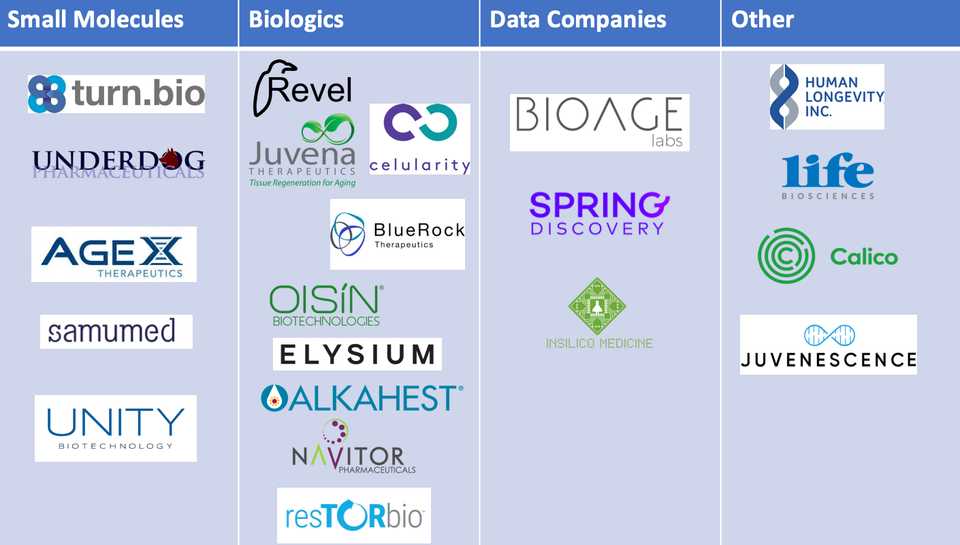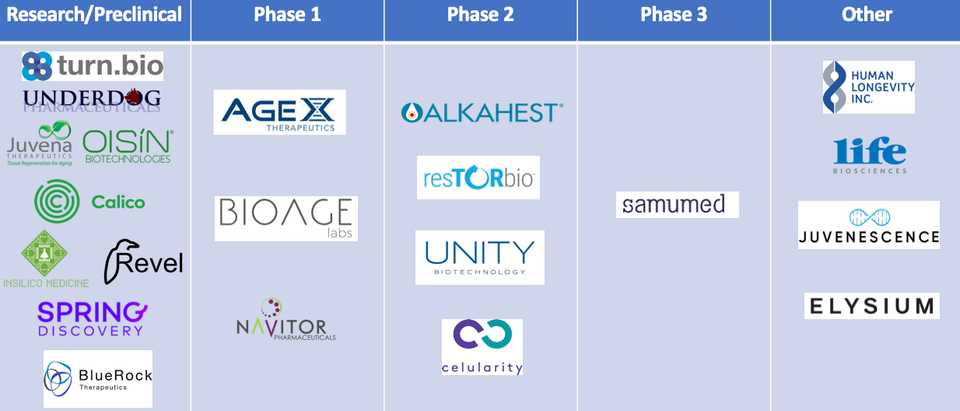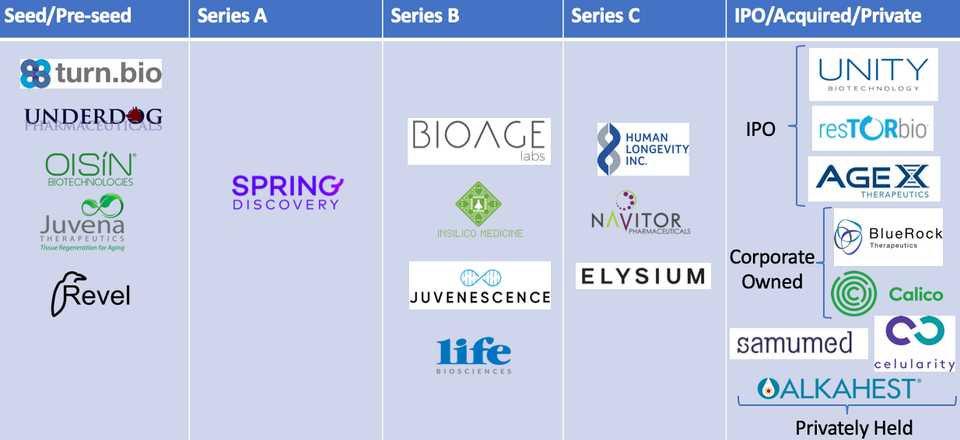Longevity Startups
When we think about the grand challenges in biology, what do we envision the future looking like? Frequently, we hear that the 21st century is the century of biology, where we unravel the source code and start to solve problems at a similar scale to how computers have revolutionized the 20th century. Food will become healthier, more nutritious, and last longer. Hunger will eventually be solved by clever engineering of food biology. We will use biology to terraform Mars and sustain life outside of Earth via microorganism engineering. Clothing, materials, energy, even climate change will all eventually be addressed by advances in biology and our ability to harness the technology given to us by nature.
For most however, I think the more pressing problem commanding most biologists, is health. We need cures for cancer, neurodegenerative disease, sense loss, autoimmune diseases, and countless other ailments that cause pain and suffering at a much deeper level than anything experienced in our privileged first world lives. Fortunately, cures are coming at a rapid pace, and it wouldn’t surprise me by if the end of the 21st century, we had treatments for every indication there is out there. What is the frontier though? What is the pipe dream that we thought about as kids?
The ability to read minds? Become invisible? Fly? For me, it was the ability to live forever, pain free, and able to experience life to the fullest for as long as I wanted. Most diseases accelerate with age, both in terms of incidence and severity. The basic gist is that cellular damage accrues over time, and as bodily repair mechanisms become worse and worse at fixing such damage, cancers, heart disease, autoimmune diseases, and others become more frequent and eventually cause death. Laura Deming, who runs a longevity VC fund and got into this type of work at 11 years old wrote a nice readable review for non-scientists here. This review article is the seminal scientific reference that emulates the famous Hallmarks of Cancer papers.
Since aging is inherently connected to disease, if we address the mechanisms of aging, we are essentially investing into the best type of prophylactic. Classifying aging as a disease itself, scientists both in academia and industry have approached it just like any other indication. While the vision is grand, current efforts are early stage and small. These companies are mostly based in California, where capital is accessible. The academic field is also in early stages. Nature just recently announced a journal dedicated to the study of aging. The major aging research centers are the National Institutes of Aging in Baltimore, Maryland and the Buck Institute in Novato, California, but all major research universities have at least a couple labs dedicated to the study of aging.
Aging & Longevity Startups
Aging and longevity focused startups are still in risky and exploratory phases. Most aging science has only occurred in animal models. Even some of the most promising aging compounds are only now reaching Phase 1 humans trials in an entirely research setting. The difficulty here is that ‘aging’ is not accepted by the FDA as an indication. There are too many things that go into extending a person’s life, so this is probably a fair choice. It can work in mice, because they don’t live very long, but a mortality study in humans would take forever, and likely wouldn’t tell you much due to the variability. A good review for looking into difficulties with aging clinical trials was published here.
The major approach used instead has to do with one’s healthspan, the period of life where you keep the majority of your bodily functions as normal.
Here, we can derive some useful endpoints such as cognitive function, metabolic health, or motor performance. Still, companies in this space need an indication to target. This depends a bit based upon the biology that you are targeting, but a common indication has been osteoarthritis. Samumed is currently enrolling for a Phase III trial testing a small molecule Wnt pathway inhibitor that regulates self renewal and differentiation of stem cells. Unity Biotech is another company that is enrolling patients for a Phase II osteoarthritis trial using a small molecule that selectively eliminates senescent cells. Each of these trials has seen initially positive results, so it will be exciting to see what comes out of these later stage trials.
How does the space look like for other companies? Below, I have created a few market maps to describe the space.
Problems with the space
As you can see, progress isn’t particularly impressive. There are a handful of companies that have received significant funding, but none have produced a clinically meaningful compound. There are a few reasons for the difficulty in building companies in this space, summarized here:
-
The biology really isn’t proven yet. In mice, we can extend lifetimes pretty easily. Caloric restriction, senolytics, stem cell treatments, all can work decently well. However, nothing has been shown in humans yet, so there is significant biological risk. Not to mention, we still don’t understand regulation of aging very clearly. There is risk that pathways that regulate aging also have a role in cancer progression. Targeting senescent cells for instance has been shown to extend lifetimes, but also promote cancer in some experiments.
-
Aging is also a difficult field to do a clinical trial in. Unlike cancers where patients are relatively easy to recruit and clear differences in mortality and progression can be demonstrated, aging is in many ways opposite to this. Your patient population will be small because you will be taking otherwise healthy old people (who might not want to participate in a trial if nothing is wrong with them), and mortality benefits can take forever to actualize.
Still, biology is powerful. There are plenty of examples of organisms of all sizes (tardigrades to molerats) that can live far longer than we would expect. With ongoing trials and more and more interest in this space, I’m optimistic that the powers of 21st century biology can make some significant headway on this problem.
For more thoughts: Crunchbase has a nice review of aging startups



